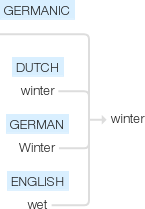Winter
Old English, of Germanic origin; related to Dutch winter and German Winter, probably also to wet.
wiktionary
From Middle English winter, from Old English winter, from Proto-Germanic *wintruz(“winter”). Cognate with West Frisian winter(“winter”), Dutch winter(“winter”), German Winter(“winter”), Danish, Swedish and Norwegian vinter(“winter”), Icelandic vetur(“winter”).
etymonline
winter (n.)
Old English winter (plural wintru), "the fourth and coldest season of the year, winter," from Proto-Germanic *wintruz "winter" (source also of Old Frisian, Dutch winter, Old Saxon, Old High German wintar, German winter, Danish and Swedish vinter, Gothic wintrus, Old Norse vetr "winter"), probably literally "the wet season," from PIE *wend-, nasalized form of root *wed- (1) "water; wet"). On another old guess, cognate with Gaulish vindo-, Old Irish find "white." The usual PIE word is *gheim-.
As an adjective in Old English. The Anglo-Saxons counted years in "winters," as in Old English ænetre "one-year-old;" and wintercearig, which might mean either "winter-sad" or "sad with years." Old Norse Vetrardag, first day of winter, was the Saturday that fell between Oct. 10 and 16.
winter (v.)
"to pass the winter (in some place)," late 14c., from winter (n.). Related: Wintered; wintering.
